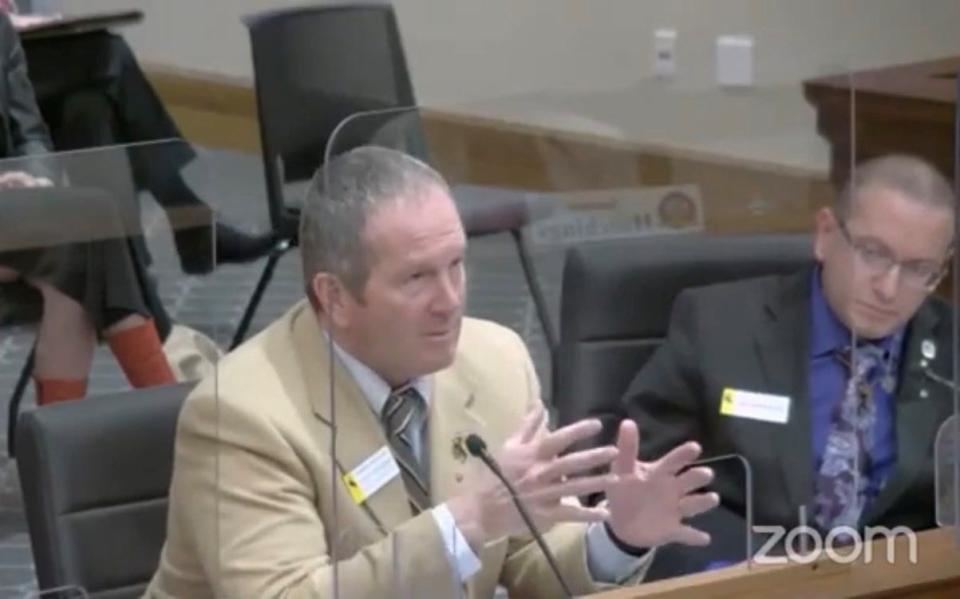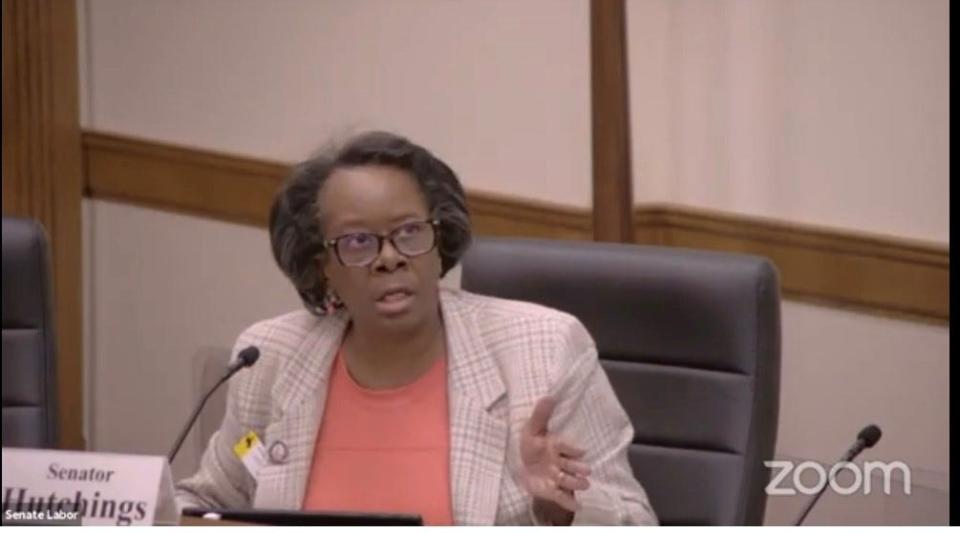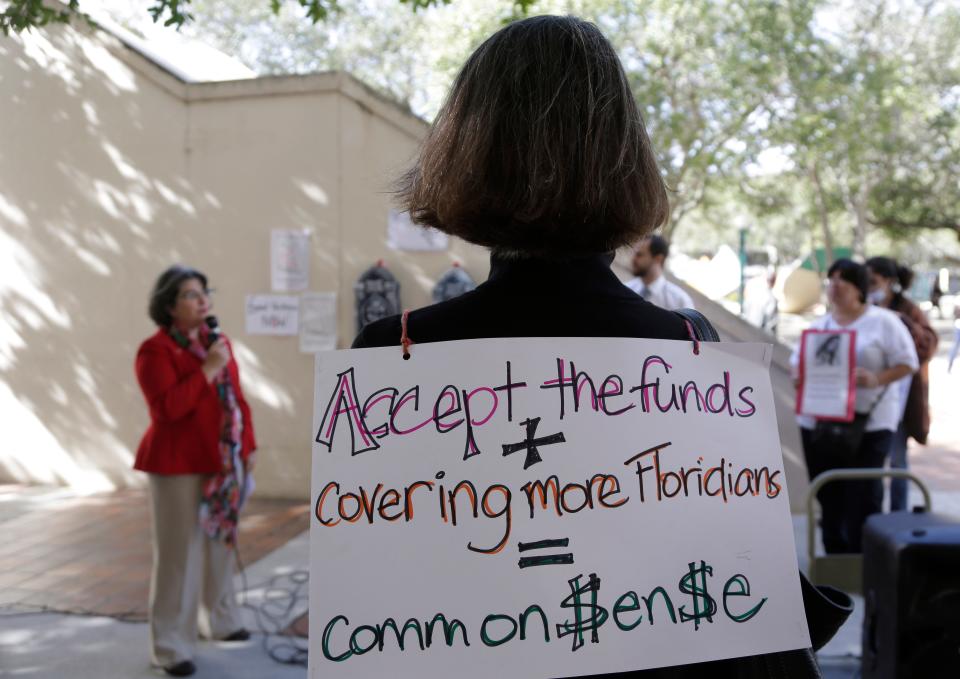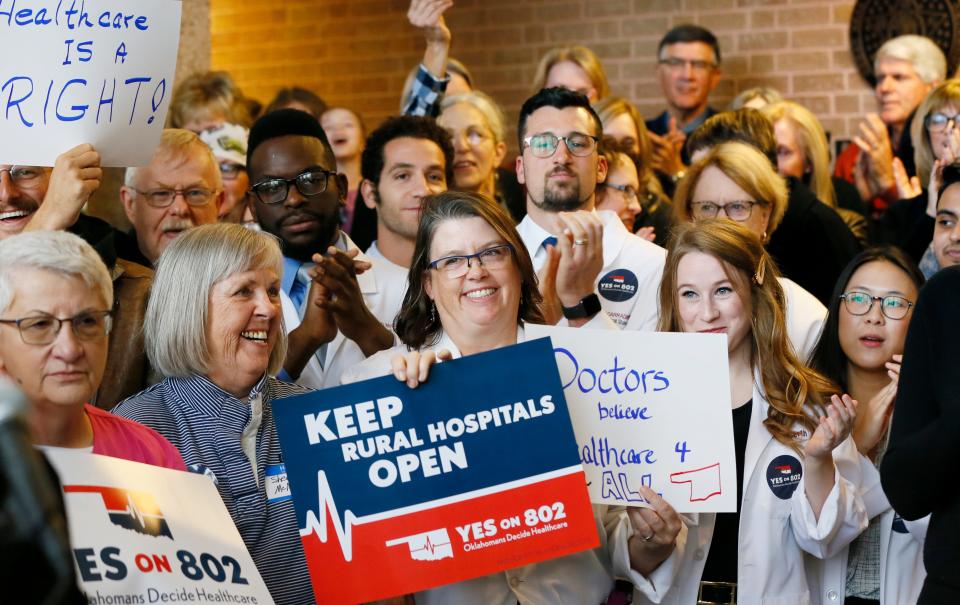Thanks but no thanks: States are wary of President Joe Biden’s offer to help them expand Medicaid
WASHINGTON – State Rep. Steve Harshman voted again and again against expanding Medicaid eligibility in Wyoming, sure there had to be a better way of getting health care to low-income residents than what the federal government offered through the 2010 Affordable Care Act.
Lacking a viable alternative, and after Washington offered an approximately $30 million bonus to expand, Harshman had a change of heart.
“I think I’ve come full circle on this,” he explained to his fellow GOP colleagues last month. “There’s not a better plan.”
Going against the state Republican Party, which called expansion a “long-term fiscal trap,” Harshman, a former state House speaker, joined the current speaker in helping pass expansion legislation through the House.


That unlikely advancement gave advocates a sliver of hope that this could be the year Wyoming joined 38 other states in making Medicaid available to people earning up to 138% of poverty.
But a week later, the measure fell one vote short of passing out of a Senate committee, killing the bill.
"I asked myself, is this found in our constitution? And I can't find it there,” said Republican state Sen. Lynn Hutchings, one of the committee members who voted against expansion. “Does the solution make me more dependent on government or more free from its control?”
New incentive may not be enough
Despite the billions of dollars in financial incentives made available through the recently passed coronavirus relief package, Wyoming’s experience shows Medicaid expansion is a struggle in the dozen states that have resisted the ACA, commonly referred to as Obamacare.
The median maximum income a family of three can have in the nonexpansion states for the parents to qualify for Medicaid is about $9,000. Childless adults of any income level can’t enroll.
Advocates aren’t giving up, pointing to signs of interest in some states, including Texas and Alabama.
Who would benefit
A combined 4 million people without insurance could gain coverage if all 12 states acted. That represents more than one-third of the uninsured in those states.
Most are in the South, are people of color and live in poverty, even though most are in a family with at least one worker, according to the Kaiser Family Foundation, a nonpartisan health research organization.
Supporters still run up against the ideological resistance to Obamacare that hasn’t subsided, even though expansion is backed by health care advocacy groups, hospital associations and some business organizations.
“Only healthy people can work,” Cindy DeLancey, president of the Wyoming Business Alliance, told the state’s lawmakers. “It's a recruitment and a retention issue for business leaders.”
Missouri fight continues
In Missouri, where 53% of voters backed a 2020 ballot initiative to expand Medicaid, GOP lawmakers are trying to block the funding needed for implementation. That’s despite the fact that Missouri is eligible for more than $1 billion in additional Medicaid funding if the expansion moves ahead.
“I think it has been helpful. I can't say that it's carrying the day,” McClain Bryant Macklin, director of policy and strategic initiatives for Missouri’s Health Forward Foundation, said of the new federal funding. “There continues to be some opposition.”
Americans for Prosperity – a grassroots arm of the political network affiliated with billionaire industrialist Charles Koch – holds events across the state to urge lawmakers not to fund expansion. Reasons include that the extra funding is temporary and Medicaid already gobbles up state spending.
“Even without expansion, it's a huge portion of our budget,” said Jeremy Cady, AFP’s state director in Missouri.
Potent political issue
If states don’t act, Democrats said, health care will be as potent an issue in the 2022 elections as it was in the 2018 midterms.
“Past being prologue here, Medicaid expansion is going to be a huge issue,” said David Turner, spokesman for the Democratic Governors Association. “It’s something that’s really popular everywhere.”
Mississippi Gov. Tate Reeves cited his successful 2019 campaign, in which he ran against “Obamacare expansion,” as evidence that he is following the will of the voters in not increasing eligibility.
“My position has not changed,” Reeves said in March.
States given option
The Affordable Care Act was supposed to reduce differences among states, including who could enroll in Medicaid, which is jointly run by the federal and state governments.
The Supreme Court said states did not have to increase eligibility, even though the federal government picks up 90% of the new cost. Multiple studies found expansion states have been able to save money in other areas, such as reducing the amount of uncompensated care at hospitals and clinics.

To encourage states to expand coverage during the pandemic, the $1.9 trillion stimulus package passed in March includes extra funding. For two years, states that expand can receive more money from Washington than their share of the cost for the new enrollees.
Texas, for example, where 18% of the population is uninsured – the highest rate in the nation – could get nearly $2 billion more.
Mixed response from states
In Alabama, which would get a bonus of about $540 million, Gov. Kay Ivey said she is open to discussing the opportunity.
“Ensuring access to quality health care for all Alabamians has long been a priority for Governor Ivey,” press secretary Gina Maiola told USA TODAY in an email. “Finding a way to pay for it has always been the challenge.”
In Tennessee, Gov. Bill Lee remains opposed to expansion. But Lt. Gov. Randy McNally, who opposed expansion for years, recently told The Tennessean the state should take a look at what Washington is offering.
In Florida, House Speaker Chris Sprowls isn’t tempted by the new funding. He is interested in another new, more limited, option to extend postpartum care coverage to women on Medicaid from two months to a full year after they have a baby.
“We’ve had this conversation about Medicaid expansion, and reasonable people can disagree,” Sprowls said at a news conference. “What this is about … is what we agree on.”

Governors in Georgia and South Carolina are focused on fights with the Biden administration over adding work requirements to Medicaid, a condition the Trump administration allowed but Biden opposes.
The Democratic governors in North Carolina, Wisconsin and Kansas made Medicaid expansion part of their budget proposals, but they have to get GOP-controlled legislatures to go along.
Cody Hand, senior vice president of government relations for the North Carolina Healthcare Association, isn’t optimistic that Gov. Roy Cooper’s proposal will be enacted, even though it would use the bonus federal funds to cover the state’s share of Medicaid expansion for about the next five years.
“I’m very doubtful that they will include expansion in their budget,” Hand said of the Legislature. “The same leadership that has been there since Medicaid expansion was an option remains.”
Republican Phil Berger, the leader of the state Senate, argued that North Carolina can’t trust the federal government not to stick the state with a higher share of the bill. He opposed giving free insurance to able-bodied adults.
"The policy issues Sen. Berger raised in his 2019 op-ed still stand," spokeswoman Lauren Horsch said. "It seems that all sides share the goal of making health care more affordable and accessible to more people, though opinions differ on the best way to achieve that goal.”
New signs of support in Texas
In Texas, when state Rep. Steve Allison helped write expansion legislation that has the support of six other Republicans, the reaction wasn’t as hostile as he’d anticipated.
“I think it’s just time,” Allison said. “I think more and more are recognizing that we need to do something.”
The Chambers of Commerce in the eight largest metropolitan areas wrote to state leaders March 30 calling for action.
Anne Dunkelberg, health care expert at the advocacy group Every Texan, said the support from business groups, some Republicans in the state House and the involvement of Texas 2036, a think tank devoted to issues important to the state's future, are big developments.
“We're finally getting lots of more moderate and business-type voices speaking up and encouraging our leadership to let this move forward,” she said.
Texas 2036 tapped Medicaid experts who used to work on the state’s program to put together a calculator that lets lawmakers test out various options and cost assumptions.
Tom Luce, the think tank’s founder and chairman, said he’s trying to refocus the conversations “more on facts as opposed to the ideological battles that have been underway for the past 12 years.”
Though circumstances have changed – including the durability of the Affordable Care Act, other states’ experiences and the new federal funding – Luce said some people planted their feet in concrete against the ACA when it first passed and may not be movable.
“But I will say that I think the tenor of the conversation has changed,” he said.
Democrats see an election issue
In 2020, Democrats fell short of their goal of capturing the state House in Texas. If state legislators block expansion, that will help Democrats win seats in their targeted states of Texas, North Carolina and Georgia next year, said Jessica Post, president of the Democratic Legislative Campaign Committee.
“The 2022 elections will be all about how did America recover from the COVID-19 pandemic and what progress has been made to get America, to get these states, back to an improved new normal,” Post said. “The fact that some of these states are continuing, after a global pandemic, to deny health care access to their citizens will be even more of an issue than it’s been in past elections.”
Turner, of the Democratic Governors Association, said Medicaid expansion was key to Gov. John Bel Edwards’ reelection in Louisiana and helped elect Kentucky Gov. Andy Beshear in 2019, showing that the issue has salience even in conservative states.
“If Republicans want to run on opposing Medicaid expansion, we welcome that,” he said.
The Republican Governors Association did not respond to requests for comment.
Expansion by ballot initiative
Medicaid expansion could end up on the ballot in states that allow their citizens to vote directly on the issue.
Ballot initiatives have passed in Maine, Utah, Idaho, Nebraska, Oklahoma and Missouri – although the fight over funding for the expansion is ongoing in Missouri.

Advocates may take the issue directly to voters in Florida, Mississippi and South Dakota. GOP lawmakers in South Dakota are trying to raise the bar through legislation that would require the ballot initiative be passed by a supermajority of citizens.
“I think that it’s still going to be an uphill climb in most of these states,” said Citseko Staples, director of state and local campaigns for the American Cancer Society which has supported ballot initiatives and worked on other expansion efforts in the holdout states. “But the enhanced federal match really does help address some of the concerns that lawmakers have made for many, many years in these states about the cost.”
‘If not now, when?’
It was the new federal funds that helped turn around Harshman in Wyoming. He also made an ideological argument he hoped would appeal to his fellow Republicans, pointing to his long record of opposing abortion.
“I've always prided myself as the most pro-life speaker in history,” he said. “These are lives, too.”
SUBSCRIBE: Help support quality journalism like this.
Two days after Harshman’s comments failed to persuade enough senators to pass the bill out of committee, the head of the Wyoming Hospital Association couldn’t mask his frustration.
“I think, in reality, this was our best bet,” said President Eric Boley, who had told lawmakers, “If not this, what? If not now, when?”
Supporters could try a ballot initiative, but those are expensive and notoriously difficult in Wyoming.
“I just don’t know what it’s going to take,” Boley said. “I feel like, with where we are in Wyoming right now, it’s going to be a real heavy lift to ever get it passed unless something really significant changes.”
Contributing: USA TODAY Network-Florida Capital Bureau and Paul Woolverton, senior North Carolina reporter for Gannett/USA TODAY Network.
This article originally appeared on USA TODAY: Joe Biden's offer to extend Medicaid gets wary reception from states

